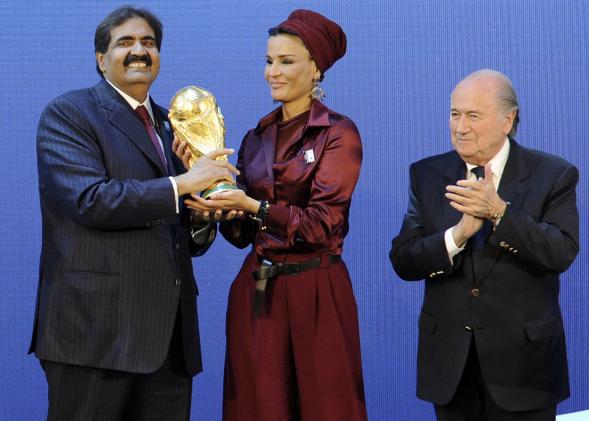The Qatari government waited longer than Russia’s Vladimir Putin to respond to the FIFA investigation, which involves accusations that Qatar won World Cup-hosting duty by paying for votes, but the response was no less tetchy. Foreign Minister Khaled al-Attiyah told a pro-government newspaper, “The attack on Qatar’s World Cup is racist. … Hosting the tournament is not only in our interest but in the interest of all Arabs.”
The World Cup-hosting experience so far can’t have been what Qataris hoped for when the country was awarded the 2022 tournament at the end of 2010. Yes, there was immediate suspicion that not everything was on the level about the decision to have a country with little international soccer history, and where summer temperatures can reach 120 degrees, host the event. But it was reasonable to suspect that the concerns would blow over and the 2022 tournament would be a glittering showcase for the tiny emirate, which, powered by sheer ambition (and the world’s largest natural gas reserves), has sought to transform itself into a major player. Unfortunately for Qatar, a lot has changed in the last five years.
With access to virtually unlimited funds and one of the region’s most powerful media entities, Al Jazeera, the Connecticut-sized peninsula with only about 278,000 citizens emerged as the most surprising power player of the 2011 Arab Spring, enthusiastically backing revolutions in several countries at a time when its Gulf neighbors were keeping a nervous eye on their own populations. The government of Emir Hamad bin Khalifa al-Thani, who stepped aside in favor of his son in 2013, gave military and financial backing to the rebels who overthrew Muammar al-Qaddafi in Libya, and Qatar was the first Gulf nation to cut ties with Bashar al-Assad. Al Jazeera’s relentless coverage was essential to the revolutions in Egypt and Tunisia. The “little emirate that could” forged close ties to the ascendant Islamist political movements in the region but remained a staunch U.S. ally and host to a massive U.S. military base. As the New York Times put it in November 2011, Qatar had “become a vital counterpoint in an Arab world where traditional powers are roiled by revolution, ossified by aging leaderships, or still reeling from civil war, and where the United States is increasingly viewed as a power in decline.”
At the same time, Qatar sought to build its cultural clout with the I.M. Pei-designed Museum of Islamic Art and campuses of several American universities. The world’s biggest sporting event would be the crown jewel, with $200 billion in infrastructure spending forecasted, not to mention the elaborate Zaha Hadid-designed stadium planned for Doha.
But then, in 2013, Mohamed Morsi’s Qatar-supported Muslim Brotherhood government was overthrown in Egypt. The country’s new military government has viewed Qatar with suspicion, freezing diplomatic ties, jailing Al Jazeera journalists, and accusing Morsi of leaking secrets to the Gulf State. Fed up with Qatar’s support for Islamist groups, Saudi Arabia, Bahrain, and the United Arab Emirates withdrew their ambassadors from Qatar in March 2014.
Since the rise of ISIS, the U.S. has grown more critical of Qatar’s support of Islamist rebels in Syria. Qatar denies providing aid to ISIS or al-Qaida, but it’s widely believed that some of its well-heeled citizens have, and that the government hasn’t tried all that hard to stop them. Qatar has also been accused of contributing to the destabilization of Libya by backing Islamist factions there. Once viewed as a potential bridge between Islamists and the West, Qatar is now more likely to be described in the Western media as “the world’s most two-faced nation.” (To be fair, the U.S. still takes advantage of both faces when it needs something from groups like the Taliban or Hamas.)
Globally, Al Jazeera remains a major media force, but the network’s American affiliate, which launched with great fanfare in 2013, billing itself as a more intelligent and sober-minded alternative to U.S. cable news, hasn’t made much of an impact in the ratings and has lately been roiled in an ugly workplace scandal.
Meanwhile, the World Cup has turned into a PR disaster. The event has shined a global light on the kafala system, the predatory sponsorship scheme that keeps the emirate’s migrant labor force, mainly from South Asia, in indentured servitude. At the current rate, an estimated 4,000 workers will die in the lead-up to the World Cup. Qatar’s working conditions aren’t new, or—in its region—unique, but thanks to the World Cup, Qatar is under pressure not just from human rights groups and the international media, but also from the event’s corporate sponsors. Swiss authorities are vowing a new investigation into the allegations of bribery in FIFA’s decision to award Qatar the cup. Qatar’s government may feel it’s under an unfair spotlight right now, but it’s a spotlight it asked for.
